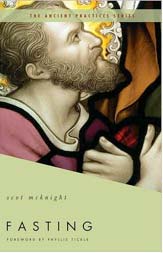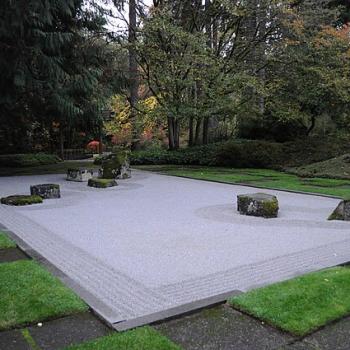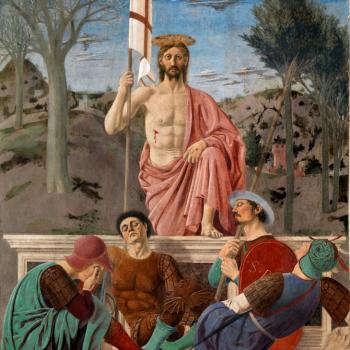By David Crumm
 "This is not a book for the cowardly."
"This is not a book for the cowardly."
That's how Phyllis Tickle, the General Editor of the Ancient Practices Series, introduces Scot McKnight's startling new book on Fasting. If it's done right, she says, the experience can be downright "disturbing."
Those are surprising words when talking about a subject we all think we understand: Fasting? It's giving up food, right?
Or, maybe it's giving up things in general, right?
Billions of people around the world do it -- certainly Jews, Muslims, Baha'is, Christians, and followers of many other faiths. We do it, because ... Well, because it's a tradition, right? A requirement of the faith. And because, it somehow ... somehow ... connects us with larger spiritual truths, doesn't it?
Well, yes it does, writes Scot McKnight, the Karl A. Olsson Professor in Religious Studies at North Park University in Chicago and the popular author of more than 20 books. But the spiritual truth of fasting is a whole lot larger than most of us suspect.
Here are highlights of our conversation with Scot McKnight:
I think this is the first book I've ever read, among thousands of books on religion I've explored in the past 30 years, that is focused entirely on fasting. When I opened the cover, I thought I knew what fasting meant, but I want to credit you with teaching me a few important things about this worldwide practice. First of all, we've gotten pretty vague in our casual use of the term, fasting, haven't we?
In the contemporary world, particularly the Christian world, fasting has become equivalent to giving up anything by choice. Some people even refer to dieting as fasting -- so the word "fasting" has become really broad and it basically means for most Christians: abstinence.
Help us sort out the two words.
When the Bible refers to fasting it's our choice not to eat any kind of food for a designated period and it might also include not drinking any water or liquids for that same period of time, normally 12 to 24 hours. On the other hand, abstinence is giving up some specific items, perhaps, while you're continuing to eat and drink other things. So, when someone tells me they're "fasting from meat," I tell them that's not really fasting. It's abstinence. When someone tells me they're fasting from Facebook -- that's abstinence, at most. Giving up Facebook certainly isn't fasting. The Muslim tradition at Ramadan is much closer to what the Bible meant in fasting.
Or the fast of Yom Kippur -- an entire day and night of fasting from all food and drink.
The meaning of fasting has been expanded in our popular culture until it is much easier to perform. The act of not eating and drinking for 12 to 24 hours is very demanding. It's much easier to give up something small.
One reason the more traditional forms of fasting are tough -- and one reason Phyllis Tickle calls your book a challenge to truly courageous readers -- is that fasting involves throwing your whole body into this spiritual response. You point this out over and over again in your book. Fasting is whole-body spirituality. It's disturbing, Phyllis points out, not only because of the physical demands -- but also because it's admitting that we're not merely a spirit hooked to a physical form. It can be disturbing to admit that we are whole beings -- mind, body, spirit hooked together as a whole.
 The opening line of your book is: "Fasting is a person's whole-body, natural, response to life's sacred moments."
The opening line of your book is: "Fasting is a person's whole-body, natural, response to life's sacred moments."
Right. The act of fasting is a very physical thing. It's almost hyper-physical to deny yourself what your body needs in order to survive and sustain itself.
It's a whole-body response to a grievous sacred moment.
You're using important words there. Your book argues eloquently that people shouldn't look at fasting as a way to get a convenient spiritual buzz. Fasting traditionally wasn't practiced as a sort of boot-camp exercise people could haul out to bulk up on their prayer life.




